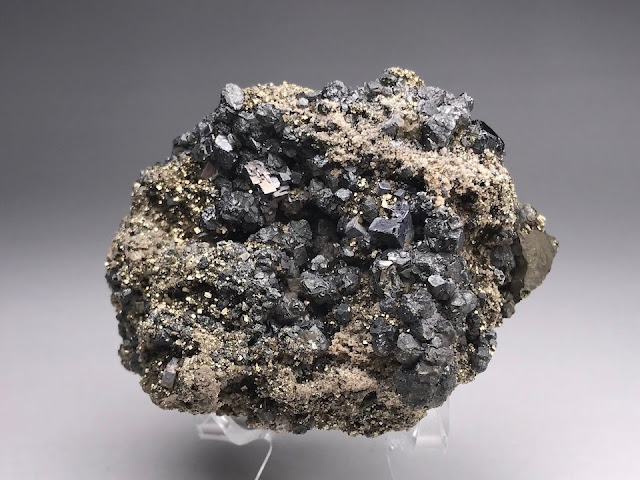鉛山の閃亜鉛鉱・方鉛鉱 Sphalerite, Galena from Namariyama
幅 width 80 mm / 重さ weight 239 g
径 4〜5 mm くらいの閃亜鉛鉱と方鉛鉱とが、細かい黄鉄鉱と重晶石とともにからみあう。1 個だけ最大辺
鉛山鉱山は、十和田湖の西岸の外輪山のふもとに位置する。江戸期より知られる古い鉱山で、鉱床は鉛山地区と銀山地区とにわかれる。前者は裂罅充填型の鉱脈鉱床、後者は塊状の黒鉱鉱床で、1985年まで稼行された。金属を溶かしこんだ熱水が海底から吹き出して沈殿したのが黒鉱型鉱床、海底に達する前に地中で固まったのが鉱脈型鉱床、とおもってよいから、ここ鉛山のように2つのタイプの鉱床が隣り合っていること自体は、それほど不思議なことでもないのだろう。
国立公園内にあることから、特に厳重な排水処理がなされたという。十和田湖というと、行くとしたらふつう南岸か奥入瀬の入り口の東岸かで、あまり観光で立ち入るところではないが、秋の紅葉でも見ながら、鉱山跡の見学に行ってみたいものだ。
Sphalerite and galena of 4-5 mm in diameter crystallize in a kuroko deposit together with fine pyrite and barite. There is also a chalcopyrite single crystal of 15 mm in size. Sphalerite doesn't show fluorescence, supporting my speculation that fluorescent sphalerite in the northern Akita kuroko deposits is characteristic around Odate area. Namariyama mine is located at the west side of Lake Towada known since the Edo era. There are Namariyama and Ginzan areas, which respectively has hydrothermal vein and kuroko deposits. The mining facilities are located inside the Towada-Hachimantai National Park. I would like to visit here in fall when colors of leaves are beautiful.


